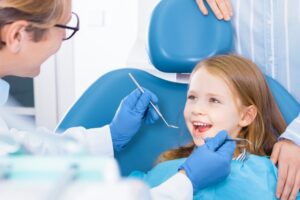
Adults across the world have to visit the dentist every day, and to be honest, not many of them look forward to it. Just imagine what it’s like to be a kid! Their imaginations are more active, and the bright lights of the office or the noise of the tools drilling might be enough to make them pretty uncomfortable. Fortunately, sedation dentistry offers ways to put them at ease. Keep reading to learn more about these methods!
What is Sedation Dentistry?
First, some background. Sedation dentistry involves using medication to help ease patients’ worried minds during dental procedures. It can help them overcome their fear and phobias, reduce sensitivity to pain, and allow for longer and more complex procedures without patient discomfort.
What Are the Types of Sedation Dentistry?
Oral Conscious
With this method of sedation, the patient takes a powerful anti-anxiety medication by mouth about an hour before the procedure. The medicine creates a relaxed, mildly drowsy feeling. Your child will remain awake and be able to respond to verbal commands, but they’ll feel very calm. Common drugs used in oral sedation include benzodiazepines like diazepam, lorazepam, or midazolam. Vital signs are monitored throughout to ensure safety.
Nitrous Oxide
One of the most common forms of sedation dentistry is using nitrous oxide, or “laughing gas,” on the patient. Delivered through a small nasal mask, the medication is delivered quickly and creates a euphoric, relaxed sensation, allowing the dentist to work with minimal discomfort to your child. They’ll be awake, responsive, and aware of what’s going on, and the effects will wear off quickly once the procedure is over.
Hospital Anesthesiology
Typically, most patients don’t need general anesthesia that will render them unconscious, but if your child is severely anxious or is going through a long procedure that they find difficult to sit through, it may prove helpful. This method involves putting your child to sleep while the dentist works, and they will wake with no recollection of what happened, which could be beneficial to them.
Are These Methods Safe for Children?
Yes, when administered by trained professionals, sedation dentistry is generally safe for children. Pediatric dentists receive specialized training in child sedation and follow strict guidelines set by organizations such as the American Academy of Pediatric Dentistry (AAPD).
Here’s why sedation dentistry is considered safe for kids:
- Careful Screening: Before any sedation is given, the dentist will thoroughly review your child’s medical history, current medications, and overall health to determine the safest approach.
- Proper Monitoring: During the procedure, your child’s vital signs – such as heart rate, breathing, and oxygen levels – are continuously monitored. This ensures that any changes are caught and addressed immediately.
- Tailored Dosage: Sedation doses are carefully calculated based on your child’s age, weight, and specific needs. Pediatric dentists use the lowest effective dose to minimize risk while keeping the child comfortable.
- Experienced Providers: Most pediatric dental offices that offer sedation are equipped with the tools and trained staff needed to manage emergencies, although serious complications are very rare.
Sedation dentistry can be a safe and effective option for helping children get the dental care they need without fear or discomfort. The key is choosing a qualified pediatric dentist and asking plenty of questions about the sedation process. With the right precautions, your child’s dental experience can be smooth, stress-free, and safe.
About the Practice
Family Dental Center of East Texas is committed to caring for all members of your family. If your child needs sedation dentistry, we can put them at ease with oral conscious, nitrous oxide, and general anesthesia methods. For the latter, we partner with the highly qualified anesthesia providers at Nacogdoches Memorial Hospital to ensure your child’s comfort and safety. If you would like an appointment, visit our website to schedule yours or call our Center office at (936) 427-9070.
